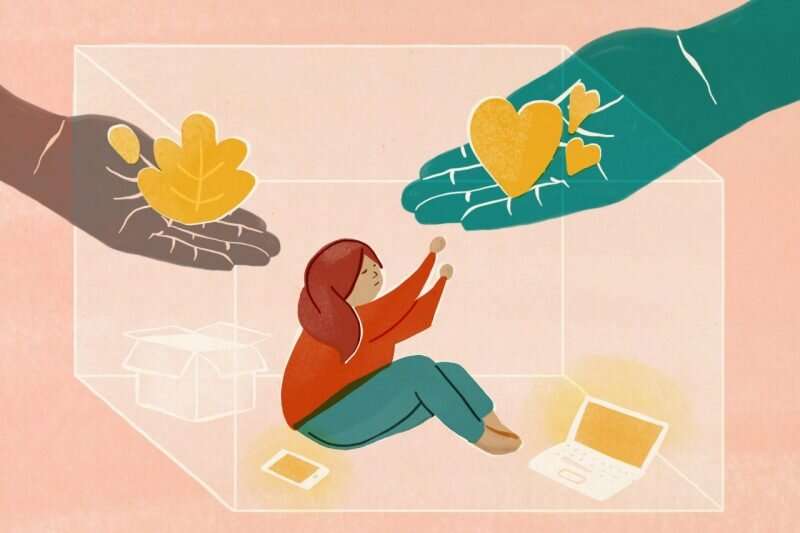
You did everything right. You wore a mask in public, received a COVID-19 vaccine, and avoided large crowds. Still, you have COVID-19.
You are not alone. More people are contracting the coronavirus as the contagious omicron variant of the disease continues to spread around the country.
Even if a vaccine has helped you to avoid severe illness, a COVID-19 diagnosis still may result in guilty feelings. People may be afraid to tell others that they or a family member have the coronavirus, for fear that they will be blamed for doing something wrong. Even some who are vaccinated for the coronavirus are afraid to take a COVID-19 test if they are experiencing symptoms.
That’s because there is a stigma attached to COVID-19, and it’s leaving many people feeling anxious and shameful, according to medical professionals.
Donald “Joe” Gieck, an assistant professor in the Department of Psychiatry and Behavioral Medicine at the Virginia Tech Carilion School of Medicine, and director of psychological services at Carilion Clinic, has worked with patients who have these feelings.
He offers advice for people in overcoming guilt or shame with a COVID-19 diagnosis.
Q. What is COVID-19 shame?
Gieck: First, it’s pretty normal for people to experience some fear and uncertainty if they contract COVID-19 due to fear of the unknown and its association with potential development of severe side effects, high transmissibility, or risk of hospitalization for oneself and others. And inherent to shame is the perception of some sort of incompetence or failure.
In the case of COVID-19 shame, so many of us have put so much effort into prevention and mitigation through wearing masks, distancing, foregoing normal social activities, and getting vaccinated. When the assumption that “I am doing everything I can to prevent this [COVID]” is broken, people may feel guilt and shame, especially when compounded with fear of the unknown for how this might affect them and others.
Often people may start to feel a sense of shame and worry, asking “What did I do wrong?”
Additionally, there is also a general stigma around [COVID-19] that has developed over the last two years, which adds to the element of shame and guilt and perception of wanting to do everything right. In the early days, everything was focused on mitigation, quarantine, and “You don’t want to get it.” We were getting updates about hospitalization numbers and infection rates. This creates a context where fear and judgment and a stigma is more likely to occur.
Q. Will the stigma of having COVID-19 go away?
Gieck: Yes, probably most of the stigma will go away with time and exposure. Basically, if COVID-19 becomes endemic then that means nearly everyone is going to come in contact with it at some point, ideally less transmissible and severe versions of it.
It is common for stigma to develop around disease and health issues we fear or are unknown. For example, there was initially a lot of fear around HIV and the stigma attached to that, but this has lessened over time; we have seen similar things in cancer and other diseases.
One of the most basic things we can do as a whole is to simply recognize that stigma does exist. It has developed due to a confluence of factors over the last two years, and we can help reduce stigma in some simple ways, such as extending a little grace to ourselves and others.
Q. What is your advice to people who are feeling guilty about having COVID-19 and perhaps exposing others?
Gieck: Know that however you feel, it’s okay and likely very normal. We encourage people to acknowledge how you feel and to acknowledge the emotion. However, be careful not to mislabel or overgeneralize what that emotion really means. For example, try not to personalize a sensation of guilt.
Additionally, if you feel an emotion, be careful not to apply meaning to it that is not factually grounded and continue to focus on making sure you take reasonable steps to manage your health. What we know is that we as creatures don’t do well with uncertainty, so it becomes important for us to take active steps to manage the outcome or the risk as best we can. If guilt, shame, distress, or anxiety become too much, talk to a healthcare provider.
Q. How long could shame or guilt linger after a COVID-19 diagnosis?
Gieck: It can linger for a period of time, including days or weeks but will usually lessen with resolution of the symptoms. The biggest thing I find that impacts ongoing shame is that folks often question whether it is safe to have contact with other people after a reasonable time has passed. They ask “I have surpassed the [isolation] window. Is it safe?”
Along those lines, we encourage people to follow the CDC guidelines around contact and exposure and do the best you can. There’s a point where you can’t reduce risk any further and are no longer likely to transmit the virus to others.
There is also an extreme end to the guilt too, and that is more of a posttraumatic stress effect among folks who may blame themselves because a family member has died or was hospitalized. They may believe they are at fault for this outcome.
Generally speaking, we have seen increasing rates of anxiety and depression as a whole over the course of the last two years due to the impact of COVID-19. In these situations, I would encourage folks to reach out to a healthcare provider to discuss and consider what options might be available.
Q. What else do you suggest that people do to manage their emotions related to the pandemic?
Source: Read Full Article
